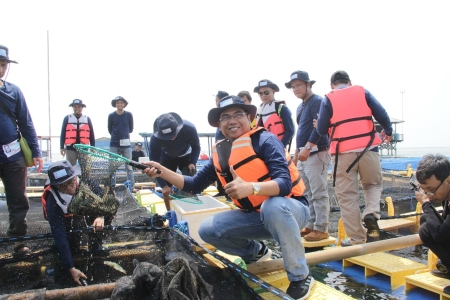Sea Vaname Shrimp Harvest, PKSPL IPB University’s Efforts to Build Economy through Sea Farming

The Center for Coastal and Marine Resources Studies (PKSPL) IPB University conducts vaname shrimp harvesting activities at the Sea Farming Center on Panggang Island, Thousand Islands. The volume of shrimp harvested is 45 kg with the average weight of shrimp is 30 grams / head (size 30).
"This harvest activity is a showcase for the development of shrimp farming activities in the sea which is part of the Sea Farming program in the framework of IPB University Agromaritime," said the Head of PKSPL IPB University, Dr. Yonvitner, recently.
On the other hand, he continued, the Sea Farming program is proof of IPB University's commitment in the implementation of IPB University's Agromaritime to encourage the blue economy. One of the steps is through the development of vaname shrimp cultivation in the sea.
"In the future, we will continue to encourage this activity as one of IPB University's innovations to make the blue economy the mainstream economy of coastal communities and small islands," he added.
In addition, said Dr Yonvitner, sea farming facilities will also be opened for all IPB University residents in developing an independent campus. He assessed that cooperation with all parties would certainly be a strength in supporting the strengthening of sea farming in the future.
Similarly, IPB University Vice Rector for Resource and Infrastructure Resilience, Dr Alim Setiawan Slamet said, shrimp farming activities in the sea are a breakthrough innovation from IPB University which is fronted by PKSPL.
"IPB University will continue to oversee and improve Sea Farming program facilities to support educational, research and community service activities. Thus, the downstream innovation of IPB University can be directly felt by the existing community," he said.
In this activity, Dr Berry Juliandi, Dean of the Faculty of Mathematics and Natural Sciences (FMIPA) IPB University added, marine programs, especially marine cultivation, must continue to be supported, both about instruments and artificial intelligence, so that sea farming can become a multidisciplinary research space at IPB University.
The same thing was conveyed by Dr Zulhamsyah Imran, Director of The Southeast Asian Regional Centre For Tropical Biology (Seameo Biotrop). He said, vaname shrimp cultivation in the sea developed by IPB University through PKSPL is a very positive thing. Because it can reduce the pressure that occurs in coastal areas due to pond land clearing activities.
"The innovation developed by PKSPL IPB University is very helpful in the development of science and technology (Science and Technology) in the future related to marine cultivation," he explained.
On the other hand, representatives of the DKI Jakarta Food Security, Maritime and Fisheries Service revealed that the quality of shrimp produced by PKSPL IPB University is premium quality shrimp, does not have the smell of mud and has a sweet taste when consumed.
"The vaname shrimp produced by PKSPL IPB University also has super quality to be served as sashimi," he continued.
Cultivation of vaname shrimp in the sea using floating net cages (KJA) is carried out for five months. Vaname shrimp farming at sea can improve the quality of shrimp meat.
"Hopefully, in the future, people in the Thousand Islands will have the interest and reliable skills to do vaname shrimp farming at sea, because the price is also higher than vaname shrimp from ponds," he hoped. (*/Rz) (IAAS/ANF)


